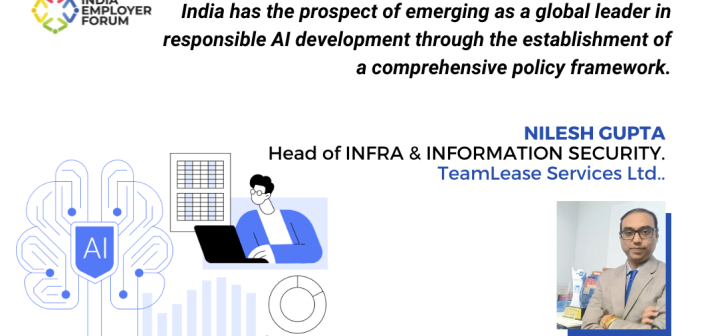Author: Nilesh Gupta, Head of Infra & Information Security, TeamLease Services Limited
The European Union (EU) has recently embarked on a significant endeavor to regulate Artificial Intelligence (AI) through the proposition of the world’s foremost comprehensive framework. This framework categorizes AI systems according to their level of risk, subjecting potentially harmful applications to more stringent regulations. India, a nation with a distinguished tradition of AI research and a swiftly expanding AI ecosystem, should heed this development.
The EU facilitates responsible innovation by establishing testing environments for startups engaged in the development of AI models. The adoption of this nurturing approach could serve as a valuable model for India to emulate. The EU’s approach offers valuable insights for crafting a robust AI policy framework in India. Within the EU framework, AI systems are categorized into three distinct classifications, which could serve as a valuable model for India to emulate.
- Unacceptable Risk: Systems deemed too dangerous are banned, including those manipulating vulnerable groups or using real-time facial recognition (except for limited law enforcement scenarios).
- High Risk: Systems requiring thorough scrutiny before deployment fall under this category. This includes AI used in critical infrastructure, employment decisions, and law enforcement. Transparency is crucial, with users having the right to challenge biased or unfair systems.
- Lower Risk: Generative AI tools like ChatGPT, while not posing a high risk, would still need to comply with transparency requirements and copyright laws.
India has a well-established foundation in artificial intelligence (AI) research, with notable contributions dating back to the 1980s. Presently, AI is revolutionizing diverse sectors, including healthcare and education. However, to fully leverage this transformative potential, India requires a robust AI policy framework. As famously articulated by Alvin Toffler, “The illiterate of the 21st century will not be those who cannot read or write, but those who cannot learn, unlearn, and relearn.” India has the prospect of emerging as a global leader in responsible AI development through the establishment of a comprehensive policy framework. This framework should not only foster innovation but also mitigate risks, ensuring that AI is utilized for the collective benefit.
Key Elements for a Responsible AI Policy
In the development of comprehensive policies, we suggest the expansion of the traditional CIA triad (confidentiality, integrity, and availability) commonly employed in security to include responsibility and transparency as foundational principles alongside the established CIA tenets. The CIART framework will emerge as a more durable and ethical framework that addresses not only the technical aspects of security, but also the broader societal implications.
Critical components of the CIART Framework consist of Confidentiality (Safeguarding sensitive information from unauthorized access), Integrity (Ensuring the accuracy, consistency, and trustworthiness of data(, Accessibility (Guaranteeing authorized individuals can access information as necessary), Responsibility (Explicitly defining roles, accountability, and ethical considerations in data management) and Transparency (Cultivating open communication, disclosure, and justification for decisions associated with data and policy). This CIART framework will thus present a comprehensive approach to policy development, encompassing both the technical and ethical dimensions of data governance. The subsequent points elucidate the sub-components of the CIART framework in detail.
1. Ethical Guidelines
- Fairness and Bias: Ensure AI systems are fair and unbiased. Implement measures to detect and mitigate biases in data and algorithms.
- Transparency: Promote transparency in AI decision-making processes. Provide explanations for AI actions and decisions.
- Accountability: Establish clear accountability mechanisms for AI development and deployment. Define who is responsible for the outcomes of AI systems.
2. Privacy and Data Protection
- Data Security: Implement robust data security measures to protect against breaches and unauthorized access.
- User Consent: Ensure that user consent is obtained for data collection and usage. Provide users with control over their data.
- Anonymization: Use data anonymization techniques to protect individual privacy.
3. Regulation and Compliance
- Legal Frameworks: Adhere to existing laws and regulations related to AI, data protection, and cybersecurity.
- Standardization: Follow industry standards and best practices for AI development and deployment.
- International Cooperation: Engage in international cooperation to harmonize AI regulations and standards.
4. Innovation and Development
- Research and Development: Encourage innovation and investment in AI research and development.
- Skill Development: Promote education and training programs to develop AI-related skills in the workforce.
- Collaboration: Foster collaboration between academia, industry, and government to advance AI technology.
5. Social Impact
- Job Displacement: Address the potential impact of AI on employment. Develop strategies for job creation and reskilling of displaced workers.
- Digital Divide: Work to bridge the digital divide and ensure equitable access to AI technologies.
- Public Awareness: Increase public awareness and understanding of AI and its implications.
6. Safety and Security
- Risk Management: Identify and mitigate risks associated with AI, including operational, cybersecurity, and ethical risks.
- AI Robustness: Ensure AI systems are robust, reliable, and secure against adversarial attacks.
- Monitoring and Evaluation: Continuously monitor and evaluate AI systems to detect and address any issues.
7. Sustainability
- Environmental Impact: Consider the environmental impact of AI technologies and promote sustainable practices.
- Energy Efficiency: Encourage the development of energy-efficient AI systems and infrastructure.
8. Economic Considerations
- Economic Growth: Leverage AI to drive economic growth and competitiveness.
- Market Dynamics: Understand and address the impact of AI on market dynamics, including potential monopolies and market disruptions.
9. International Competitiveness
- Global Leadership: Position the country or organization as a leader in the global AI landscape.
- Trade Policies: Develop trade policies that support the growth of AI industries and international collaboration.
A comprehensive AI policy framework can result in the following:
- Economic Growth: Enhanced productivity and the creation of new opportunities across various sectors driven by AI.
- Global Competitiveness: India can establish itself as a frontrunner in responsible AI development, thereby attracting investments and fostering collaborations.
- Public Trust: Clearly defined regulations can instill public confidence in the secure and ethical utilization of AI.
- Transparency and Explainability: AI models should be explicable, enabling human comprehension of their decision-making processes, thereby aiding in the identification of potential biases or errors.
- Human Oversight: Human involvement remains pivotal in AI decision-making processes, particularly in setting parameters, reviewing outputs, and making ultimate decisions.
- Data Privacy and Security: Adherence to data privacy regulations is imperative, along with implementing robust security measures to safeguard sensitive data utilized in AI development and deployment.
- Ethical Principles: Well-established ethical principles should govern AI development and usage, concentrating on fairness, non-discrimination, transparency, and accountability.
India has the potential to become a global leader in responsible AI development by incorporating elements from the EU’s approach. Ensuring regular reviews and employee training on the AI policy framework will be essential for its long-term effectiveness. This proactive approach will pave the way for a future where AI benefits all of India. A well-defined AI policy framework can offer several benefits, including mitigating risks, promoting ethical use, and balancing innovation and regulation. This involves safeguards against potential misuse of AI, promoting fairness, transparency, and responsible AI development, and encouraging innovation while preventing misuse and building public trust in AI.




